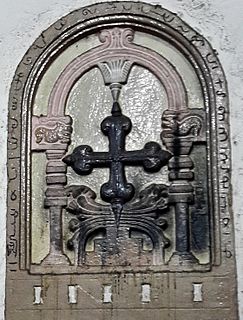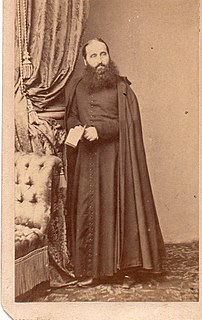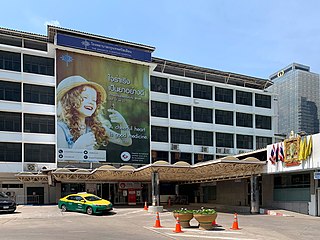See also
- Christianity in Africa
- List of Christian Missionaries
- List of converts to Christianity
- List of Protestant mission societies in Africa
- Mission (Christian)
- Timeline of Christian missions
This is a list of Roman Catholic missions in Africa .

A missionary is a member of a religious group sent into an area to promote their faith or provide services, such as education, literacy, social justice, health care, and economic development.
This timeline of Christian missions chronicles the global expansion of Christianity through a listing of the most significant missionary outreach events.

The Catholic Church in Nigeria is part of the worldwide Catholic Church, under the spiritual leadership of the Pope, the curia in Rome, and the Catholic Bishops' Conference of Nigeria (CBCN). The present president of the CBCN as of 2020 is Augustine Obiora Akubeze, Archbishop of Benin city, who was preceded by the Archbishop of Jos Catholic Diocese, Ignatius Kaigama.

A Christian mission is an organized effort to spread Christianity to new converts. Missions involve sending individuals and groups across boundaries, most commonly geographical boundaries, to carry on evangelism or other activities, such as educational or hospital work. Sometimes individuals are sent and are called missionaries. When groups are sent, they are often called mission teams and they do mission trips. There are a few different kinds of mission trips: short-term, long-term, relational and those that simply help people in need. Some people choose to dedicate their whole lives to mission. Missionaries preach the Christian faith, and provide humanitarian aid. Christian doctrines permit the provision of aid without requiring religious conversion. However, Christian missionaries are implicated in the genocide of indigenous peoples. Around 100,000 native people in California, U.S., or 1/3 of the native population, are said to have died due to missions.

The Catholic Church in Thailand is part of the worldwide Catholic Church, under the spiritual leadership of the Pope in Rome.

Christians in Bangladesh account for 0.4% of the nation's population as of 2011 census. Together with Judaism and Buddhism, they account for 0.7% of the population. Islam accounts for 90.4% of the country's religion, followed by Hinduism at 8.5% as per 2011 census.

Christianity is the third-largest religion after Hinduism and Islam, just ahead of Sikhism and Buddhism with about 27.8 million adherents, making up 2.3 percent of the population as per the 2011 Census of India. The largest subgroup are the Dalit Christians, while the oldest in the Indian Christian community are the St Thomas Christians. Written records have it that Christianity was introduced to the Indian subcontinent by Thomas the Apostle, who sailed to the Malabar region in 52 AD, the present-day Kerala state. There is a general scholarly consensus that Christian communes were firmly established in Malabar by the 6th century AD, these were Eastern Christians of the Church of the East in India, who worshipped in Syriac. As a result Malankara Nasranis have a unique Syro-Malabarese culture which includes Christianised Jewish elements, along with some Hindu customs and values. Following Portugal's discovery of the Cape route during a voyage by the explorer Vasco da Gama in the 15th century AD, Western Christian denominations of Latin Christians and Protestants formed in the cities of Portuguese Goa and Damaon, British Bombay, French Pondicherry, Danish Tranquebar etc.

A society of apostolic life is a group of men or women within the Catholic Church who have come together for a specific purpose and live fraternally. It is regarded as a form of consecrated life.

Marie-Alphonse Ratisbonne, N.D.S., was a French Jew who converted to Christianity and became a Jesuit Catholic priest and missionary. He later was a co-founder of the Congregation of Our Lady of Sion, a religious congregation dedicated to the conversion of Jews to the Christian faith.
The Catholic Church in Papua New Guinea is part of the worldwide Catholic Church, under the spiritual leadership of the Pope in Rome. Papua New Guinea has approximately two million Catholic adherents, approximately 27% of the country's total population.
United Society Partners in the Gospel (USPG) is a United Kingdom-based charitable organization.
Missionary work of the Catholic Church has often been undertaken outside the geographically defined parishes and dioceses by religious orders who have people and material resources to spare, and some of which specialized in missions. Eventually, parishes and dioceses would be organized worldwide, often after an intermediate phase as an apostolic prefecture or apostolic vicariate. Catholic mission has predominantly been carried out by the Latin Church in practice.

Christianity was first introduced to Thailand by European missionaries. It represents 1.17% of the national population, which is predominantly Buddhist. Christians are numerically and organizationally concentrated more heavily in the north, where they make up an estimated 16% of some lowland districts and up to very high percents in tribal districts.

The Martyr Saints of China, or Augustine Zhao Rong and his Companions, are 120 saints of the Catholic Church. The 87 Chinese Catholics and 33 Western missionaries from the mid-17th century to 1930 were martyred because of their ministry and, in some cases, for their refusal to apostatize.
Characteristic of Christianity in the 19th century were evangelical revivals in some largely Protestant countries and later the effects of modern biblical scholarship on the churches. Liberal or modernist theology was one consequence of this. In Europe, the Roman Catholic Church strongly opposed liberalism and culture wars launched in Germany, Italy, Belgium and France. It strongly emphasized personal piety. In Europe there was a general move away from religious observance and belief in Christian teachings and a move towards secularism. In Protestantism, pietistic revivals were common.
Christianity and colonialism are often closely associated with each other due to the service of Christianity, in its various sects, as the state religion of the historical European colonial powers, in which Christians likewise made up the majority. Through a variety of methods, Christian missionaries acted as the "religious arms" of the imperialist powers of Europe. According to Edward Andrews, Christian missionaries were initially portrayed as "visible saints, exemplars of ideal piety in a sea of persistent savagery". However, by the time the colonial era drew to a close in the later half of the 20th century, missionaries became viewed as "ideological shock troops for colonial invasion whose zealotry blinded them", colonialism's "agent, scribe and moral alibi".

The arrival of the Europeans in 15th century into the then Gold Coast brought Christianity to the land. There were many different cultural groups across the West African region who were practicing different forms of spirituality. As the Europeans explored and took control of parts of the country during the colonial days, so did their religion. Christianity is the religion with the largest following in Ghana. Christian denominations include Catholics, Methodists, Anglicans, Presbyterians, Lutherans, Seventh-Day Adventists, Pentecostals, Baptists, Evangelical Charismatics, Latter-day Saints, etc.

Christianity is the largest religion practiced in Zimbabwe, accounted for more than 84% of the population. The arrival of Christianity dates back to the 16th century by Portuguese missionaries such as Fr. Gonsalo Da Silveira of the Roman Catholic Church. Christianity is embraced by the majority of the population. It is estimated 85 percent of Zimbabweans claim to be Christians, with approximately 62 percent regularly attending church services. Christian faith plays a very important role in the organization of Zimbabwean society.